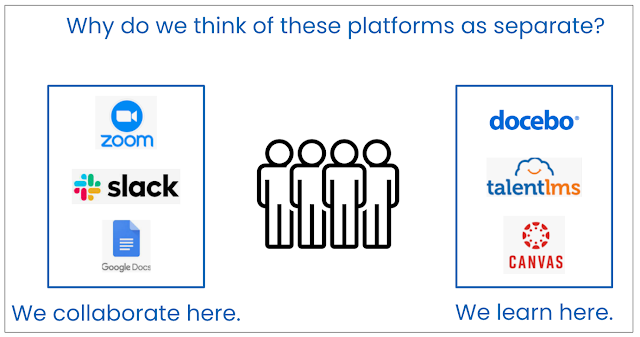I like to talk to people about what systems, structures, and platforms they use to help their teams collaborate, learn, and problem-solve.
It doesn't really matter if I'm talking with trainers, consultants, or educators. I usually hear something like this:
"We have our (training) courses inside of (INSERT NAME OF LMS HERE). And, then we collaborate every week on (INSERT ZOOM, SLACK, GOOGLE MEET, ETC)"
When did we start thinking / saying this?
Was this a prevalent phrase pre-pandemic? I don't remember hearing it then. (Perhaps I wasn't listening.) It's certainly a common paradigm now. More importantly, what impact does its arrival have on the way we structure our team's environments?
For starters, it brings up a few odd questions.
- Aren't we naturally better learners when we collaborate? Aren't we better collaborators when we're learning along the way?
- Don't we do one better when we incorporate the other?
- When we think of the systems we use, why do we naturally separate these two?
SPOILER PREVIEW FOR A FUTURE POST: Reflect on the "collaboration" during your last Zoom meeting. Did it feel like a collaborative experience with different people "leading the dance"? Or, did it feel like a lecture with Q&A?
- Reanna Mardinger wrote a great piece within eLearning Learning, Collaborative Learning in the Workplace
- Cornell's Center for Teaching Innovation: Collaborative Learning


